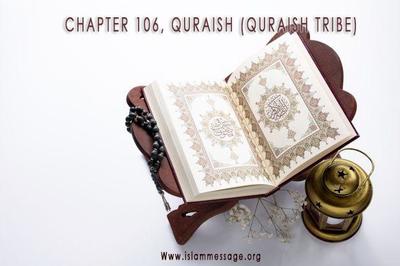
The title of this four-verse chapter is Quraish which refers to the tribe of Quraish mentioned in the first verse. The Quraish was the ruling tribe in Mecca at the time of the birth of Prophet Muhammad, may the mercy and blessings of God be upon him. They were a tribe of merchants and were the custodians of the Kaba. The Quraish was made up of ten main clans including Hashim, the clan to which the Prophet belonged. The chapter Quraish was revealed in Mecca and has a particularly close association with the previous chapter The Elephant (Al-Fil). In chapter 105, The Elephant, God defeats the threat to Mecca from the Yemini King Abrahah, thus in Chapter 106, Quraish, the trading and trading journeys carried out by the tribe of Quraish are secure. In fact, some of the early Muslims regarded these two chapters as one chapter. However, when compiling the Quran for future generations the scholars of the time set chapters 105 and 106 down as two separate chapters. Regardless of whether they are one or two chapters there is little doubt that the latter is a continuation of the former.
Verses 1 & 2 Safety and security
God begins this chapter saying, for the convenience of the Quraish, and to secure their winter and summer journeys. This implies that God destroyed the army of Abrahah for their benefit. The Meccans relied heavily on the trade with Yemen and therefore if Abrahah had been successful he would either have taken over their business or would have prevented them from entering Yemen. Thus both the winter and summer trade journeys were secured. The Quraish sent caravans to Yemen in winter and to Syria in the summer. They were able to travel throughout the Arabian Peninsula and beyond in relative peace and security. They established themselves along the breadth of the two routes and were met with generosity and admiration.
The security of the Quraish also meant security for the Kaba, which is the focal point of Islam. The Quraish were the custodians of the Kaba. As their position in the land was raised, due to God’s favor and their trading expertise, the Kaba became safe from the usual marauding and plundering that took place across the Peninsula. The Quraish found themselves in an exclusive position with a guaranteed means of sustenance. This security was a direct result of their custodianship of the Kaba; its sanctity is ordained and preserved by God. Thus it could be said that for the sake of Islam God destroyed the Army of the Elephant and in doing so secured the future of the Quraish.
Verses 3 & 4 Worship and be grateful
So let them worship the Lord of this house, the Kaba. He is the One who provides them with food to ward of hunger and provides them with safety to ward off fear. God reminds the Quraish of the blessings He provided for them. God provided them with food. Their land is barren and infertile, they would have starved if God had not provided them with a means by which to feed and support themselves. The life of the Quraish could have been one of fear and apprehension but God granted them security and allayed their fears. These two verses serve as a reminder to the Quraish that their custodianship of the Kaba has a great effect on their lives. It was also an admonition exhorting them to worship God in the way that He expects and deserves.
When Prophet Abraham had completed the rebuilding of the Kaba, he prayed that He make this place a city of peace and sustain its inhabitants with the fruits of the earth. God answered the prayer of Prophet Abraham, however, despite this many of the Quraish were not thankful or grateful to God and still others were polytheists. It is as if God is saying if you cannot be grateful for all the blessings God has bestowed on you at least show some gratitude for this one huge favor, namely sustenance and security.
The Quraish should have been gratefully worshipping their Lord, the Lord of the Kaba, the one who provided them with sustenance and security. Their land was only a desert but it provided them with a livelihood, and God protected them from all their enemies even their most formidable foe Abrahah. Instead of being grateful the Quraish persistently spoke and acted against Prophet Muhammad and the message he preached.
This chapter is a clear admonition to the Quraish and a warning that God could, if He so desired, destroy them as thoroughly as He had destroyed and humiliated the Army of the Elephant.


